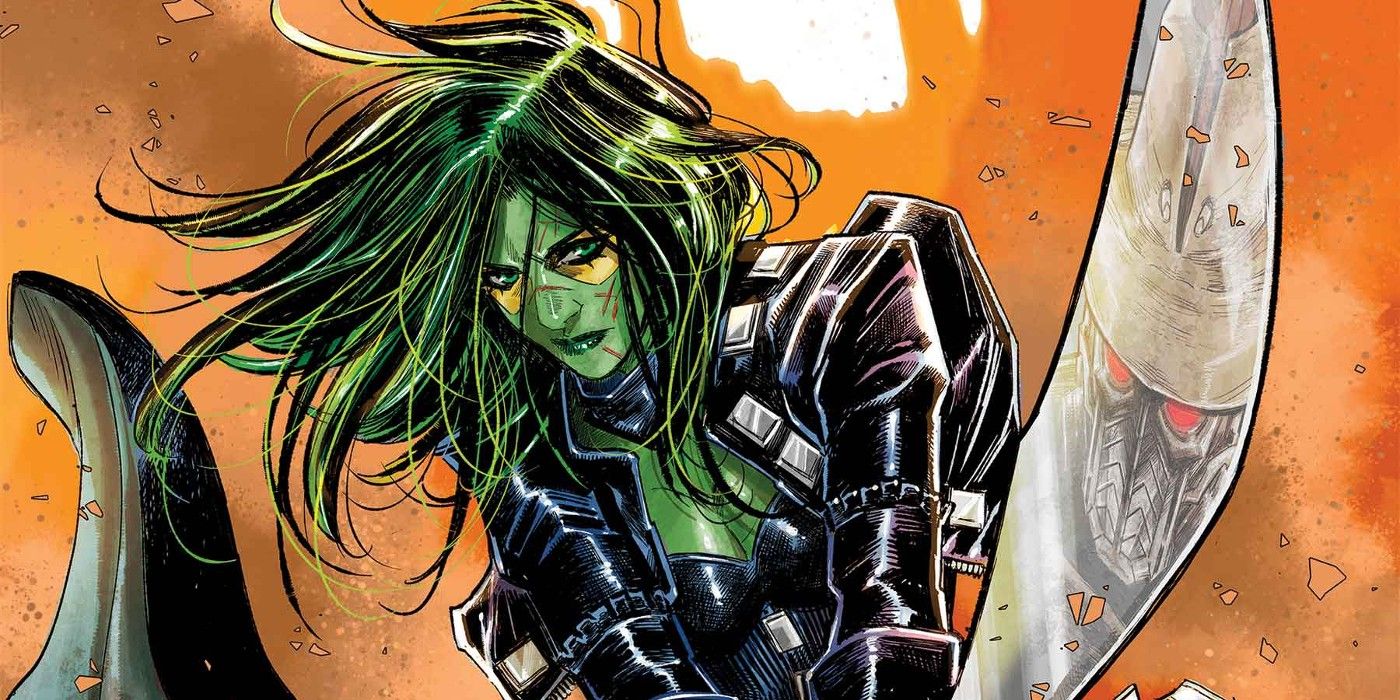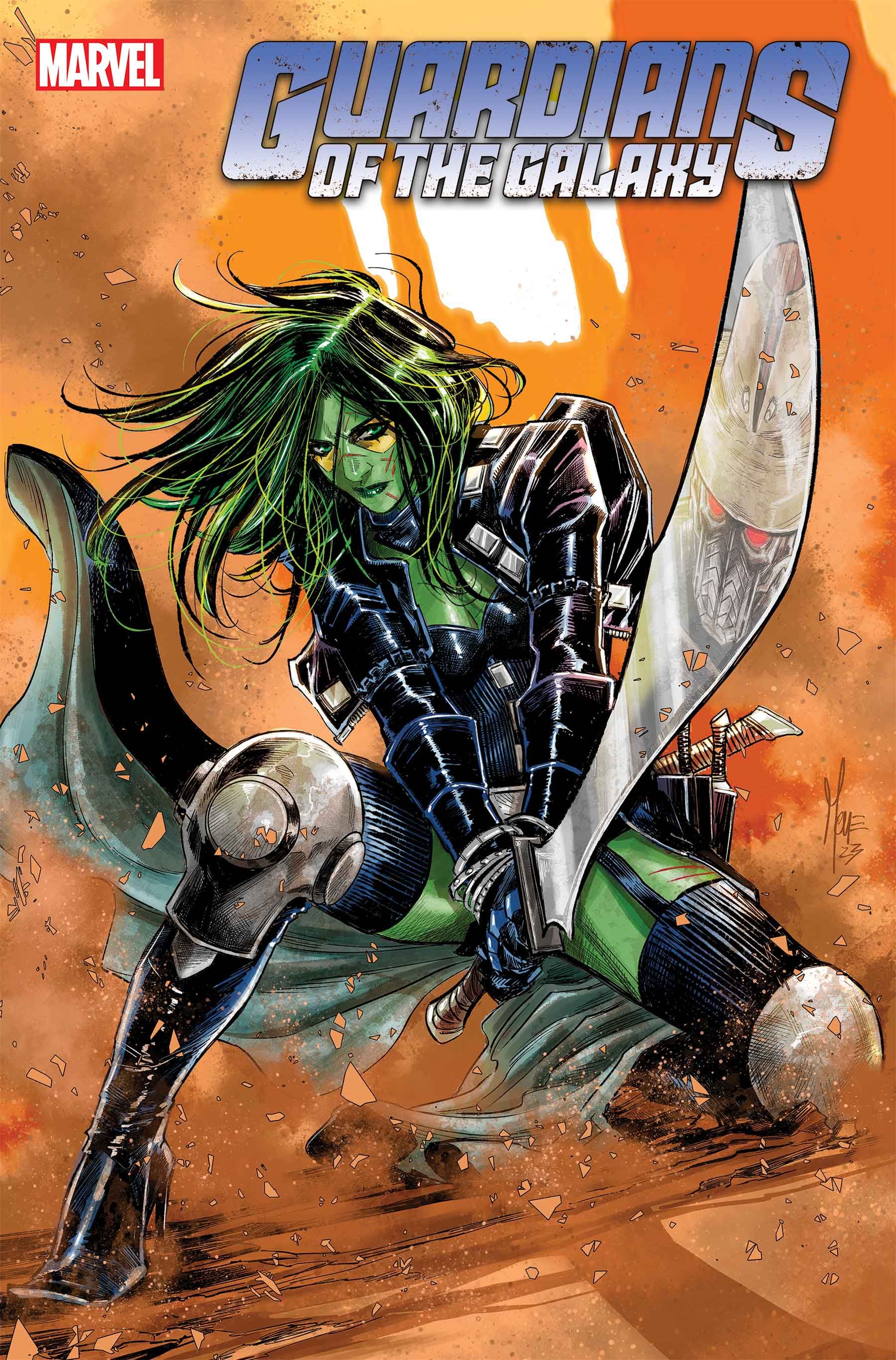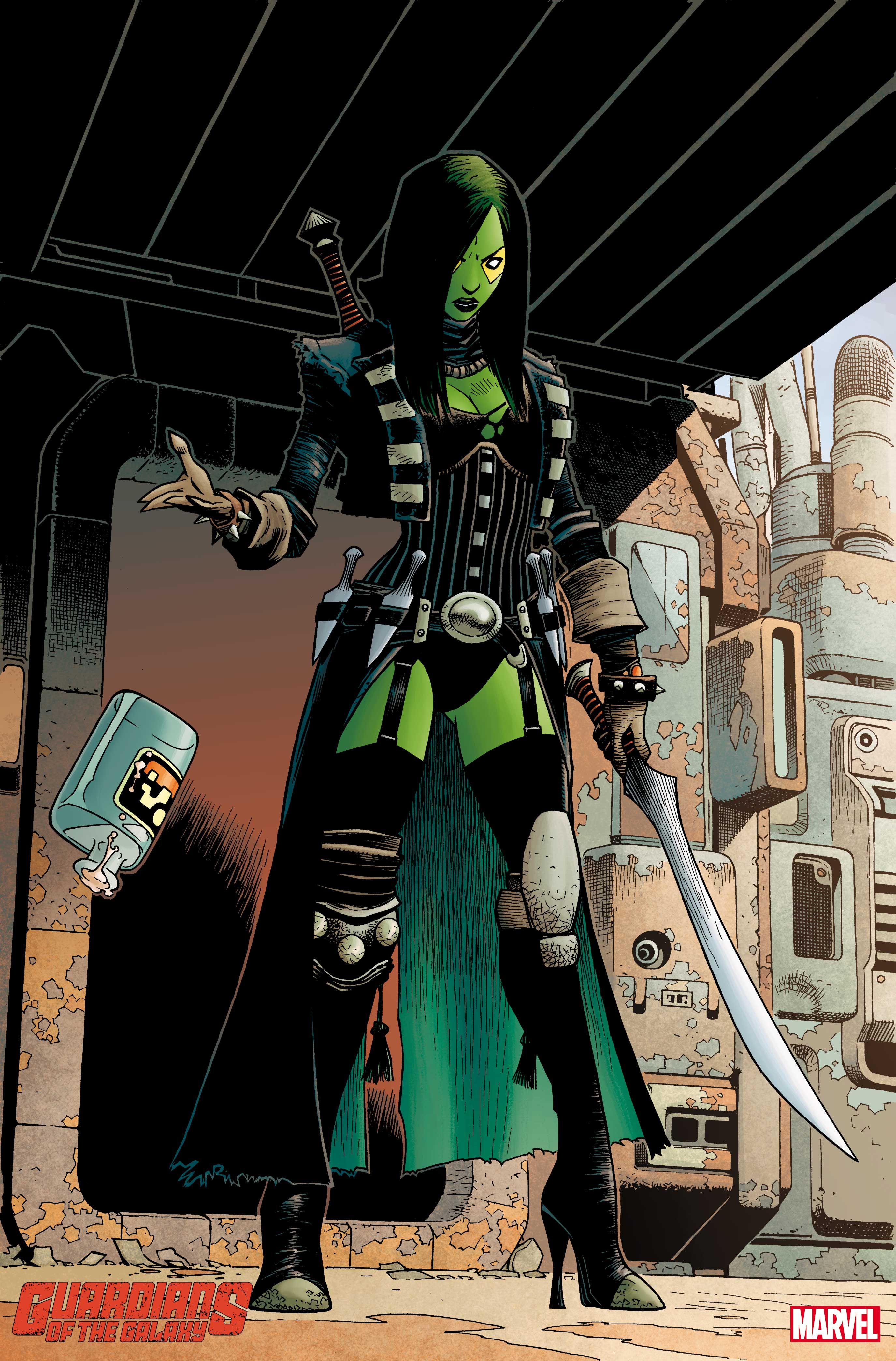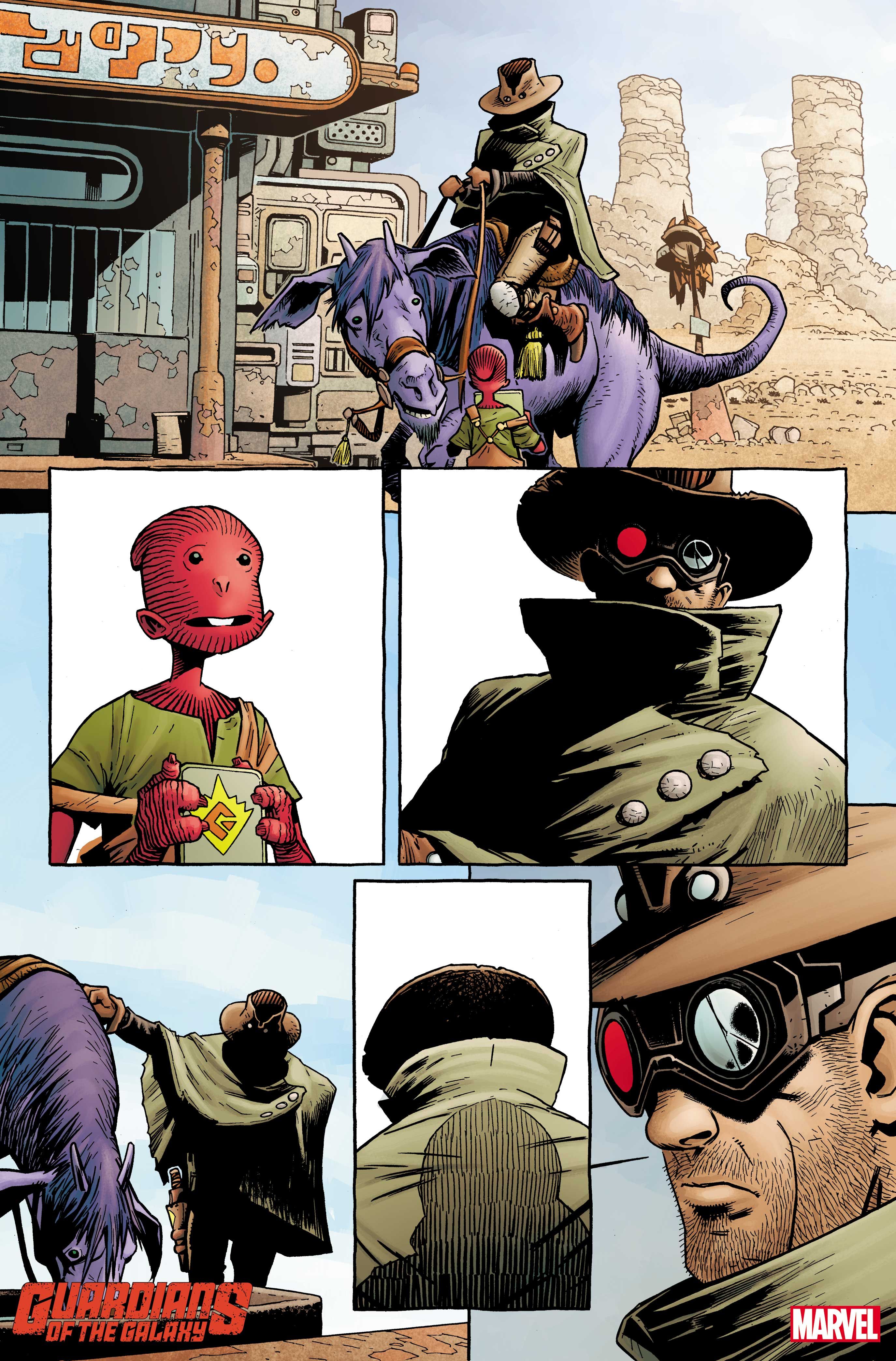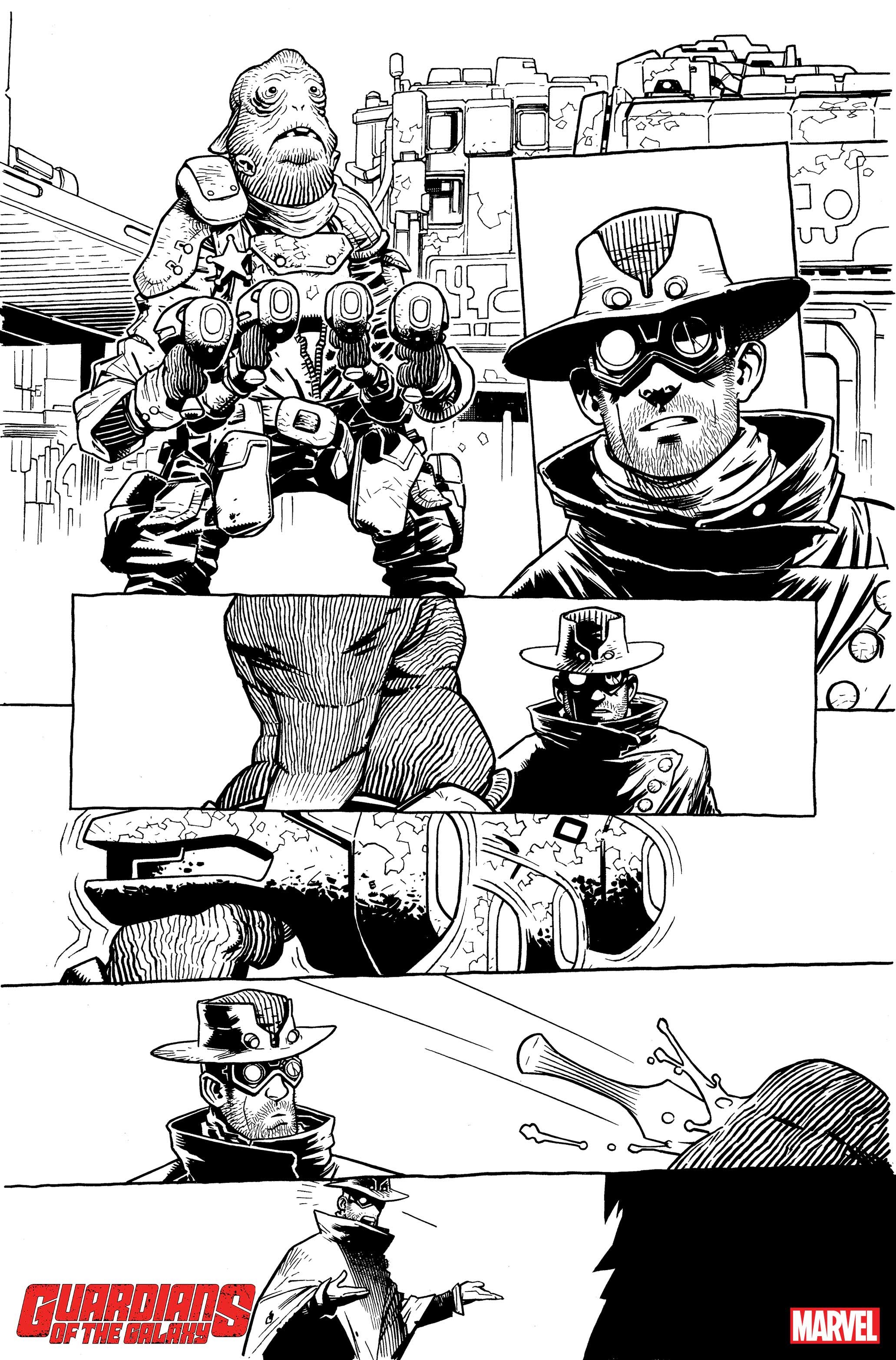Being a hero in the Marvel Universe doesn’t just mean standing tall against evil. It also means that when that evil or tragedy knocks them down, they find a way to pick themselves up, dust themselves off, and get back into the fight. It’s true on Earth, and readers of the upcoming volume of Guardians of the Galaxy will see it’s true out in the Marvel Cosmos as well.
The new Guardians of the Galaxy ongoing series, which launches in April from writers Jackson Lanzing and Collin Kelly, featuring art by Kev Walker, finds the Guardians’ spirits and ranks decimated by a mysterious and tragic event that occurred before the series begins. In order to rediscover their heroism and perhaps reinvent themselves, the interstellar heroes head out to a new galactic frontier. CBR spoke with Lanzing and Kelly about what the Guardians will find there, the issues they’re wrestling with, and how the series mixes superhero action with elements of the Science Fiction and Western genres. Also included are three pages from Guardians of the Galaxy #1, with art by Kev Walker and colors by Matt Hollingsworth, the cover for Guardians of the Galaxy #2, by Marco Checchetto, and character designs from the series.
CBR: Given the love you’ve shown for superheroes and sci-fi in books like Captain America: Sentinel of Liberty and IDW’s Star Trek series, it feels like Guardians of the Galaxy is a perfect book for you. The glimpses I’ve seen of Kev Walker’s artwork, though, suggest it will be a series that allows you to show off a love of Westerns as well.
Jackson Lanzing: I think the cheap version of this book would be, “We made the Guardians a Western! Now they’re all in cowboy hats!” I think that could be a really fun book, but when we first started bandying about the idea of doing a “Space Western,” Collin rightfully pointed out that doesn’t really mean anything because Westerns aren’t a singular genre. There are all kinds.
Collin Kelly: Yeah, the Western is an aesthetic.
Lanzing: Exactly! So, our initial conversations were really about, “What kind of Western do we want to make?” Is this The Searchers? Unforgiven? High Plains Drifter? Or is this 3:10 to Yuma? In what framework does this story sit? Ultimately, what excited us was it’s that next stage of the Guardians of the Galaxy -- something that takes these characters and pushes them into a territory that fundamentally opens up who they are and shows totally new sides of their characters. Once we realized that, we put them into an Unforgiven-style Western, one that was dark, sad, intense, and unforgiving.
These characters have been psychedelic superheroes, lovable smugglers, and cosmic war fighters who are living under constant chaos. This was a chance to take them somewhere completely different. So, the Western became a way for us to say that the tone of this book is going to be different from the Guardians books that you’re familiar with, and it allows us to get a little crazier.
Kelly: Also, Westerns can be so many things, but at the core, they’re tragedies. They’re stories about looking at this impossible-to-contain Old West and knowing you are among the last who will see the wonder of this unexplored territory. That’s sad, and that’s really what we wanted to key into. We’d write an amazing psychedelic superhero space jaunt, and we’d write amazing screw-ups trying to make some cash! Those runs exist, though, and they’re amazing! So, we really wanted to capture that feeling of you’re at the end of your ride, and what does the horizon hold for you?
Al Ewing’s Guardians run ended with them becoming the sort of Avengers of the larger galaxy. It sounds like, though, when your series begins, some things will have happened to the Guardians and the galaxy.
Lanzing: Yes! This was our biggest initial step, and we talked to Al about it. We wanted to make sure there was no disrespect implied in what we’re doing. That last moment at the end of Al’s Guardians of them all together in the bar having a good time was an amazing end for that story, but you can really only tell one story after that -- the story of what happens when all of that goes wrong, when that peace, happiness, and beauty is shattered. Otherwise, there’s no drama.
So, this is a story where it all fell apart because something very deep, personal, violent, and tragic happened with the Guardians. What if the worst day in the Guardians' history happened between the end of Al’s run and the beginning of ours? The mystery of what happened that day, how it happened, who was responsible, and who thinks they’re responsible will all come out over the course of the run.
We’re not picking up the things that were left at the end of Al’s run, but that doesn’t mean they didn’t happen, or those characters aren’t the same characters. It hurt and has potential dramatic stakes because Al set them into such a beautiful position at the end of his run. So, ideally, we’re trying to take that happiness and utilize it forward by blowing it up.
Part of Ewing’s series was about the Guardians being a stabilizing force on the larger geopolitical cosmic landscape of the Marvel Universe. So, what shape is the larger galaxy in when your series begins?
Kelly: What we really want to do is approach this story as if you’re thinking about the Old West. The world we know is the North and the South -- the conflicts, the trauma, the tragedy. Part of what we’ll discover is the trauma that broke the Guardians up has sent them on a new course.
Lanzing: Yeah, we’re using the whole new space sector that opened up at the end of Dan Slott’s "Reckoning War" story in Fantastic Four. Our entire story is going to take place in an area known as the Manifold Territories.
Kelly: So, we’ll touch on the wider world and stakes of the universe, but our focus really is on a frontier story. Part of a frontier story is, yes, there are the bureaucrats and all the organizations going on back East, but we’re looking at something brand new and unexplored.
Lanzing: What we’re interested in is using this space to discover and create new characters and new frameworks. We’d love to tell tales about the Skrull and the Kree, but they’ve had a lot of time out front. We’d rather tell our own story in a new space and add new material to the Marvel Universe.
That’s been our big mission statement since we came to Marvel. Let’s build new stuff and follow in the footsteps of our heroes like Brian Bendis, Brian K. Vaughan, and G. Willow Wilson -- these people who came in, made new stuff, and left it behind for other people to play with. We hope to do the same. So, that’s what we’re doing with the territories. You’ll see a lot of new aliens.
What issues are the Guardians dealing with as a group when your series begins?
Kelly: Our watchword when we were putting this together was we needed to look at them and not just break apart the family, but to threaten the very idea of family. We want to take them to a place where each of them is in a state of trauma and crisis. Whatever happened, even though they are together, none of them feel safe in expressing their inner trauma. So they are holding on to that crisis, and each of them is expressing it differently, which is where we draw a lot of the fun.
Lanzing: Our characters were superheroes, and now they are something else, but they’re also not outlaws in the traditional sense. I don’t want to describe their mission. I want people to see it in Issue #1. The plan behind that new mission, though, is to do something that feels halfway between heroism and complete desperation. That desperation, crisis, and trauma are a big part of all the characters.
Your revealed cast includes Star-Lord, Gamora, Drax, Nebula, and Mantis. What can you tell us about your takes on and plans for them?
Lanzing: Gamora is effectively living in her most nihilistic version of herself. You’d think that turns into a dark and scary version of her. Gamora allows you to flip the script on that, though, because Thanos took so many of her “human” emotions and messed with them. So now, in this place of nihilism, Gamora is one of the only people having fun. She’s quick to crack a joke. She’s got a drinking problem. She’s going through some very different stuff for Gamora.
We’re picking up Nebula from the Vita Ayala series that was curtailed by the pandemic, but it opened with Nebula getting this famous scientist to put a computer in her head that allowed her to calculate the probabilities of all things. She’s still got that computer, and it’s going to be a fundamental part of her character moving forward, and it changes how she interacts with the rest of the crew.
Kelly: Drax is our Jeremiah Johnson-style mountain man.
Lanzing: Yeah, he’s going through his own spiritual journey. He’s been an in-between-points character for ages, and we think it’s high time Drax starts looking at himself and figuring out what he wants. So, we’re having him start to self-interrogate.
We’re probably having the most fun with Mantis. She’s been defined for almost her entire existence by motherhood. She was the Celestial Madonna who was going to have this kid, and it would be this whole thing. Now that we’ve gone through "Empyre," that’s done. She’s completed her destiny. We wanted to see what it looks like when this character, whose whole life has been defined by motherhood, gets a chance to find another way forward.
It could be, like everyone, we’re obsessed with Everything Everywhere All at Once, but we loved the idea of having a character start to look for herself in the Multiverse, in the framework of all the possibilities she could be, and to start trying on personalities and ideas the way you might try on an outfit. That felt like something dark and fascinating, and it fits in with what we’re trying to do with the Guardians in crisis mode. It also let us have the most fun because, on a dime, Mantis can switch from your best friend to a warrior princess to an entertainer to a hardcore engineer. She’s sort of our Swiss Army knife, but whether she remembers who she was before or cares about you when she switches is a big part of that question.
Kelly: She’s a young, hot mom whose kid is out of the nest, and she never got a chance to discover who she was meant to be outside of that. So, she could be a little calmer, but she’s like, “Screw that! I’ve got to make up for time.”
It sounds like this will be a dark series, but there will be plenty of character-based levity.
Lanzing: It is a book that’s fundamentally sad, dark, and intense, but it’s also a book with some of the funniest lines we’ve written. It’s our only book with full-on slapstick gags and big, weird, goofy stuff. It’s simultaneously the funniest and darkest thing we’re writing.
There are some iconic and fan-favorite Guardians missing from your initial lineup. Will we see the fates of those missing members addressed soon?
Lanzing: That depends on who you mean. I don’t want to give Moondragon or Phyla-Vell fans false hope. We have no plans for either character right now. It’s not because we don’t love those characters. It’s because we have enough stuff on our plate, and we really want to make sure we are servicing the characters we set out to make stories about. We find if we expand our cast beyond a certain number, people get lost.
Kelly: If you’re talking about our little rodent friend and his arboreal bestie, Rocket and Groot, there may be some things in the hopper.
Yes, the press release mentioned an event called "Grootfall."
Lanzing: Yep, that obviously has something to do with Groot, and we’ll learn more about that in Issue #1. With Rocket, you’ll have to wait for a few more issues. We want his absence to be felt before we explain what’s up, but we do want to let people know we have plans for Rocket. We are using his absence to tell part of the story before it makes sense for him to come back.
So, similar to what you did with Sharon Carter in Captain America: Sentinel of Liberty?
Kelly: Yes! When he does come back, it’s going to rip! It’s one of the first issues we pitched where everyone was like, “WHOA! YES!” To do that, though, we have to build to it.
I imagine another appeal of this series is watching a legend like Kev Walker design the worlds and inhabitants of this new territory that you’re exploring.
Lanzing: Kev takes a script as a guidepost to the story being told. Instead of sprinting off, doing something different, and coming back with inks, though, he writes out these essays and does layouts. So, you get these documents from him -- and we never got them from another artist -- where he goes through the changes he made and explains why he made them. Then you can ask for something back or even encourage him to go bigger with a change.
So, by the time you get to your inks, it’s not the script anymore. It’s a collaboration between you and Kev. He’s gotten himself deep into the storytelling by that point. So I think of this book as having scripts by Collin and me, but issue-by-issue, the story is all three of us. We’re all working together to make this a comic, which is how I think some of the best comics in history have been made. It’s a new experience for us, though -- one we’re having a blast with. Kev’s internal pages are incredible. I love his work, and I think this is the best thing he’s ever done. It’s so cool.
What else can you tell us about the worlds of the Manifold Territories and the people we’ll meet there?
Kelly: We wanted to emulate those feelings of the Old West and bring an idea of war -- of people attempting to gobble up this frontier and claim it for themselves. So along those lines, we created two main cultures that are in this space. On one side, we have a group that wears black armor called Sectors United. This group is a collaboration of a lot of smaller planets who have effectively banded together in order to stand up to larger forces, like the Skrulls or the Shi’ar, who might otherwise push them around. They’re uniting as a strong force, and, of course, as a strong force, they’re going to expand into the relatively empty new frontier along their border because that’s their “Manifest Destiny.” Why wouldn’t they reach out in that direction?
Lanzing: On the other side of that we have the more mysterious species we’re calling the White Caps. They’re also moving in conquest in this space, and both of these forces have effectively met at a frontier battle line that exists through the Manifold Territories and is constantly moving and shifting. So we call it “The Fight for the ‘Fold.”
It’s a reflection of the sort of “civilizing” forces of the galaxy moving into the Manifold Territories and starting to destroy this beautiful frontier, but it’s also a chance to bring in characters from Peter’s past and characters who can act as exciting foils. When I tell you that the war is prosecuted on Mysterium you can understand how it might be a nice payday for anybody. There are a lot of different ways that the Fight for the ‘Fold brings these Western tropes into the world of the Guardians of the Galaxy while also giving us brand new, science fiction flavored, adventures.
It sounds like your initial adventure is essentially the fireworks caused by dropping the Guardians into this powder keg of a situation.
Kelly: 100%. They would like nothing more than to keep their heads down and try to solve their problems, but unfortunately, they’re the Guardians of the Galaxy. So, they can’t walk anywhere without kicking a hornet’s nest. They have the worst luck of any superhero team in the Marvel U.
Finally, in terms of the long-form story, will your Guardians of the Galaxy run essentially be the tale of a group of people who got knocked to the ground and are learning to stand up and be heroes again?
Lanzing: That’s exactly it! How long that takes and what form that redemption takes is a question for the ages. Our objective here is nothing short of rebuilding to a space where the Guardians can embrace the kind of heroism people expect from them. We want to make it a tough, revealing, and rewarding journey. Ultimately, we don’t want this to be a slog.
I think sometimes it might sound like a slog, like we’re taking them through the mud. Ideally, it’s not that. Instead, it’s a constant and exciting reveal of exactly how delightfully mad these characters are, even in the most desperate of circumstances. It’s also about how that insecurity and weirdness is the key to them being heroes. The more that they embrace and celebrate that within themselves, the more heroism the Guardians of the Galaxy are capable of. The reason they’re so relatable is they’re the weirdos who don’t belong on any other team. When you put them all together, yes, they find a family, but also shared heroism.
Kelly: I think fans can also get excited about the structure of our run. Initially, we’re popping off five individual issues. This is the story of every week coming to a new town and discovering the trauma, drama, and pain, then engaging with that and not necessarily resolving it in the best of ways, but stepping into it in their own way and then coming out the other side.
This will feed into a larger, tied-together narrative, but our goal really is that if you missed Guardians #1, you can pick up Guardians #2. If you missed #2, you can pick up #3. We want to do these modular stories to set up the stakes and give people a lot of chances to jump on.
Lanzing: If you’ve never read a Marvel cosmic book or care about any of the stuff I deeply love, like Adam Warlock, that’s cool. You don’t need to in order to pick up and enjoy this book. This is a book for anyone. We’re giving you a fresh start on these characters and their narrative. Old fans will see the stuff we’re lacing in from old runs, but we’re not defining ourselves by what has come before. We’re defining ourselves by what’s happened since then and where we’re going to go from there.
Jackson Lanzing and Collin Kelly's Guardians of the Galaxy Issue #1, with art by Kev Walker, hits shelves in April 2023.

